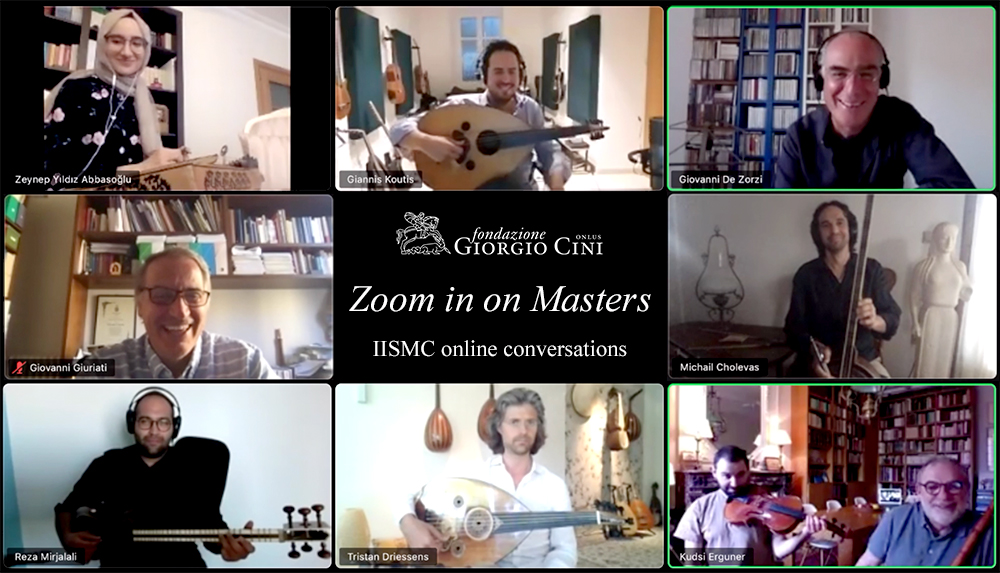
Zoom in on Masters IISMC online conversations

Zoom in on Masters is a new project created by the Intercultural Institute of Comparative Musical Studies (IISMC), coordinated by Simone Tarsitani and focused on some “masters” of important musical and dance traditions, who had been due to perform on the island of San Giorgio. In a virtual space, they will converse on music topics of common interest and describe their own activities as well as some IISMC projects which, because of the international coronavirus health emergency, have inevitably been suspended.
All the meetings are directed by Simone Tarsitani (Durham University), who, together with Marco Lutzu (University of Cagliari), is also responsible for the Institute’s training and research program in the field of audiovisual ethnomusicology, Sguardi musicali.
The fourth edition of Zoom in on Masters, called Poetas and Guitarroneros of Central Chile, to be published on June 18th, 2021, explores the Chilean tradition of canto a lo poeta.
As in previous editions, the video of the Zoom event has been enhanced in the post-production stage before being uploaded today on the Fondazione Giorgio Cini YouTube channel.
Moderated by ethnomusicologists Stefano Gavagnin from Venice and Claudio Mercado from the Museo Chileno de Arte Precolombino, Santiago, the session features a conversation with cantores populares Roberto Carreño and Erik Gil. A particularly interesting aspect of the project is the fact that musicians are filmed in their own setting, in situations that also enable us to explore the context in which their performances usually take place. To convey the liveliness of the encounter and conversation, the film is shown in the original language (Spanish) with English subtitles.
In some rural localities of central Chile, at times even just a few kilometres from the metropolis of Santiago, a tradition of sung folk poetry, rooted in the deep layers of Spanish colonial culture, has survived, albeit with syncretically absorbed native elements. In their texts (versos) – partly learnt through oral transmission and partly newly created or improvised – the singers a lo poeta deal with biblical and parabiblical themes (or canto a lo divino) and profane themes (canto a lo humano). The profane themes include verses “for history, astronomy, arithmetic” and so on, reflecting ancient forms of knowledge of Mediaeval origin, while other songs are embedded in social life: weddings, funerals, etc.
The cantores accompany themselves on guitars with specific transposed tunings and especially the Chilean guitarrón, a peculiar local derivation from the Spanish baroque guitar. The modal settings along with the metric forms of poetry and the tradition of poetic counterpoint have evolved from a Hispanic colonial substratum, shared by various other regions of Latin America.
This fourth Zoom in on Masters video further enriches the vast IISMC collection of audiovisual documents available on the Fondazione Giorgio Cini YouTube channel.
__________________________________________________________________________________________________________________________________
Online Conversations published in 2020
In the first conversation, Kudsi Ergüner, director of the long-standing Birûn project devoted to Ottoman classical music, talks to Giovanni De Zorzi (Ca’ Foscari University of Venice) and some musicians who participated in previous Birûn workshops as scholarship holders. They reflect on the overall value of the project and its benefits for training and research. They also introduce the theme of the instrumental compositions of Prince Dimitri Cantemir (1673-1723).
In the second meeting, Sabine Châtel, a music promoter particular active in Syrian music circles, is in conversation with Giovanni De Zorzi, some musicians currently in Syria and Paris, and Massimiliano Trentin (University of Bologna). They discuss the importance of the Syrian musical tradition in the Arab and Middle Eastern world. The musicians, including the famous singer Omar Sarmini, were supposed to give a concert of classical Aleppo singing, an unusual, refined style that will be described in the conversation, forcly cancelled. The musicians also give their views on the special existential and professional condition of a generation of musicians who have had to live with the civil war and now with the pandemic, many of them far from their home country, and how music making continues even in these difficult conditions by adapting to circumstances.
In the third video, Kapila Venu, a dancer and actress of the Kutiyattam theatre from Kerala and director of the Natana Kairali Research and Performing Centre for Traditional Arts, talks with Vito Di Bernardi (Sapienza University of Rome) about the performance she had planned for San Giorgio in June 2020, centred on the famous Parvati Viraham, the story of Parvati, wife of the god Shiva. While fully respecting tradition, the actress adds some fascinating contemporary nuances, thus indirectly addressing issues of gender and the female role, which are of great relevance in today’s Indian society.
